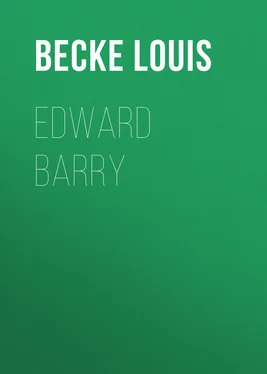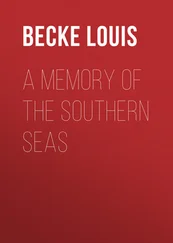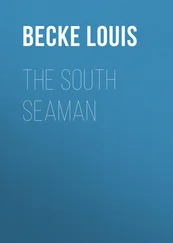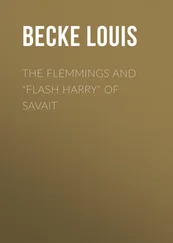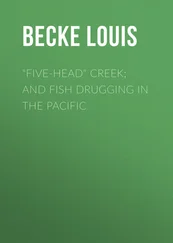Louis Becke - Edward Barry
Здесь есть возможность читать онлайн «Louis Becke - Edward Barry» — ознакомительный отрывок электронной книги совершенно бесплатно, а после прочтения отрывка купить полную версию. В некоторых случаях можно слушать аудио, скачать через торрент в формате fb2 и присутствует краткое содержание. Жанр: foreign_prose, literature_19, foreign_antique, на английском языке. Описание произведения, (предисловие) а так же отзывы посетителей доступны на портале библиотеки ЛибКат.
- Название:Edward Barry
- Автор:
- Жанр:
- Год:неизвестен
- ISBN:нет данных
- Рейтинг книги:4 / 5. Голосов: 1
-
Избранное:Добавить в избранное
- Отзывы:
-
Ваша оценка:
- 80
- 1
- 2
- 3
- 4
- 5
Edward Barry: краткое содержание, описание и аннотация
Предлагаем к чтению аннотацию, описание, краткое содержание или предисловие (зависит от того, что написал сам автор книги «Edward Barry»). Если вы не нашли необходимую информацию о книге — напишите в комментариях, мы постараемся отыскать её.
Edward Barry — читать онлайн ознакомительный отрывок
Ниже представлен текст книги, разбитый по страницам. Система сохранения места последней прочитанной страницы, позволяет с удобством читать онлайн бесплатно книгу «Edward Barry», без необходимости каждый раз заново искать на чём Вы остановились. Поставьте закладку, и сможете в любой момент перейти на страницу, на которой закончили чтение.
Интервал:
Закладка:
As the brig's forefoot came over her anchor Rawlings, who gave his orders very quietly, waited for a favourable moment. A gust of wind canted her head away from the shores of the little bay, and in a few seconds her anchor was a-trip, and under her fore and main topsails and headsails only the Mahina wore round, and began to slip through the water.
As soon as the anchor was secured Rawlings came for'ard and stood beside his chief mate, watching the shore lights.
"That'll do, Mr. Barry. We're all right now. With this westerly we won't run foul of anything coming up the harbour. Leave a couple of these native chaps here on the look-out; they can see through a stone wall."
In less than an hour the brig was between the heads, and then Rawlings told Barry to make more sail, and gave the helmsman his course, E.N.E.
As the mate called out to the hands to loose the topgallant sails, and half a dozen men sprang aloft, the captain turned to Barry.
"Oh, I had quite forgotten those gaol-birds. Bos'un, bring a light. Come with me, Mr. Barry, and," he added, "bring one of these with you," as he took a belaying-pin out of the rail.
Wondering what was now afoot, Barry followed the skipper to the deck-house, the after part of which was used as a sail locker. The door was locked.
"Hold that light up, bos'un," said Rawlings quietly, as he took a key from his pocket, and opened the door. "Now then, men, come out, and look smart about it."
One by one the four rough fellows whom Barry had seen on the wharf in the afternoon came out. The tallest of them, with a sullen look at the captain, muttered something under his breath.
"None of that, now," said Rawlings, and quick as lightning he dealt the man a smashing blow on the head with the iron belaying-pin. He fell full length upon the deck and lay there motionless. Rawlings looked at him with calm unconcern. "Take him for'ard," he said in drawling tones to the other three, "and take warning too. Let me see one of you but look sideways at me or any of my officers, and you'll get a surprise. Off you go."
Shortly after four bells had struck, as the chief mate was seated on the skylight smoking his pipe, and thinking of the unnecessary violence of Captain Rawlings, Barradas, who had the watch, stopped in front of him.
"Don't you care about turning in?" he asked civilly.
"No, I don't feel a bit sleepy; in fact, I'll be glad when it's eight bells."
The second mate nodded, took a couple of turns up and down the deck, and then stopped again. "What do you think of the Mahina ? She can sail, eh?"
"She does seem very fast."
"Fastest vessel in the Pacific for her size, but a bit overmasted. Think I can give her the royals now—the wind is taking off, and sea going down fast." Then, after he had given the necessary orders, he began again.
"Heard you were mate of the Tawera , mister."
Barry nodded.
"Then you're used to kanakas and their ways"—this half questioningly, half affirmingly. "These chaps here—most of them, anyway—are kanakas. Good sailor men too. Better than those – swabs we had to shove in the sail locker until we got to sea. But I daresay we'll knock some work out of them."
"Did they try to run away, then?"
Barradas grinned. "We didn't give 'em the chance. We're short-handed as it is."
"I heard that half a dozen of your men had bolted," said Barry.
"Did you? Why, who told you? Oh, the wharf policeman. Yes, that's right enough; we did lose six men. They were six of our best men, too—Penrhyn Islanders," and then he quickly moved away, and thrusting his hands in his pockets seemed deeply interested in the man who was loosing the fore-royal.
Presently Rawlings came on deck, and said to Barradas—
"Poor Tracey is dead. He breathed his last a few minutes ago." And then he addressed Barry.
"My poor mate is dead, Mr. Barry."
Barry jumped up in astonishment. "I'm sorry to hear that, sir. And I had no idea he was on board."
"Yes, poor fellow," replied Rawlings quietly, "he refused to go ashore, in fact pleaded so hard with me, that I could not resist his wishes. He hated the idea of dying in an hospital, so I gave way to him."
"What was his illness?"
Rawlings hesitated a moment, and then answered, "I might as well tell you, though only Mr. Barradas and myself are aware of the cause of his death. Two days ago he shot himself in a fit of depression. I had two doctors off at once to see him, but they both told me that he could not possibly live, and that even to move him ashore would hasten the end. Now, will you come below?"
With a curious, but yet undefined feeling of dissatisfaction Barry went below with the captain, who, taking off his cap, opened the door of one of the state-rooms, and motioned to his chief officer to follow.
Lying in the bunk of the state-room, which was well lit up, was the figure of a man, who, when Rawlings lifted the sheet which covered his face, was handsome even in death and appeared to Barry to have been about thirty years of age. Round the forehead and upper part of the head was a bandage. This Rawlings lifted and showed Barry a bullet hole in the left temple. Then covering up the dead man's face again, he stepped out into the main cabin, and motioned Barry to a seat.
"Sit down, Mr. Barry. You must listen to me for a few minutes, and I shall now quickly explain to you one or two things that may have appeared somewhat strange to you since you joined the ship. I have had a very great deal of trouble, trouble that my officers have shared with me. But I must tell you the story in detail, painful as it is for me to relate it; indeed, neither Barradas, myself, nor the boatswain, the only three remaining out of the ship's original company, care to speak of it, for death and disaster have followed us throughout.
"When that poor fellow Tracey joined me in Honolulu as mate he was accompanied by his wife, a young Australian lady, to whom he was deeply attached. He was anxious to pay for her accommodation during the cruise, but to this I would not consent. And I saw he was simply overjoyed at her being allowed to sail with him.
"I bought this vessel intending to run her among the Marshall and Caroline Islands in the usual trade—you know: coconut oil, turtle shell, and sharks' fins. After leaving Honolulu we cruised among the eastward islands and did well—so well that we nearly filled the ship. Then we stood away for the Carolines, and on our way ran into Port Lêle on Strong's Island, to wood and water. It was after we left there that Tracey lost his wife. Poor girl, her end was a terrible one."
He sighed, and then resumed. "A very terrible end—she was lost overboard. But let me tell the whole story.
"Whilst we were lying at anchor at Lêle we met an old trader there, with whom Tracey and myself frequently spent an evening. One night, when we were talking together over various matters, the old man, who was very ill at the time, told us that he had a secret to reveal, if we made it worth his while. Knowing him as I had for many years as an honest old fellow, I listened with interest to what he had to say, and in a few minutes he had satisfied Tracey and myself that he knew of the existence of one of the richest pearling grounds in the Pacific; and provided he could find partners who would deal squarely with him, he would disclose the exact locality. His poverty had prevented him from buying a vessel and returning to the island, which was only a week's sail from Lêle; but as the years went by, and his prospect of buying a vessel seemed as far off as ever, he determined to seek the aid of others. As a proof of his statements, he not only showed us a dozen or so of splendid pearl shells, but also a score or two of magnificent pearls. Some of these he entrusted to me to sell for him in Sydney. I have, at his request, kept a few for myself. Let me show them to you."
Читать дальшеИнтервал:
Закладка:
Похожие книги на «Edward Barry»
Представляем Вашему вниманию похожие книги на «Edward Barry» списком для выбора. Мы отобрали схожую по названию и смыслу литературу в надежде предоставить читателям больше вариантов отыскать новые, интересные, ещё непрочитанные произведения.
Обсуждение, отзывы о книге «Edward Barry» и просто собственные мнения читателей. Оставьте ваши комментарии, напишите, что Вы думаете о произведении, его смысле или главных героях. Укажите что конкретно понравилось, а что нет, и почему Вы так считаете.
